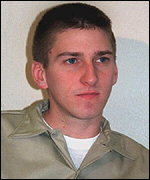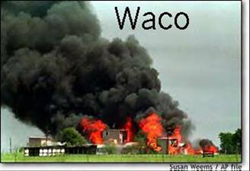Home / Older Categories
Subsections:
It was a massive case (pdf) to defend. There were:
- 30,000 interviews of witnesses taken by the FBI and other government agencies.
- More than 200,000 photographs
- Records of 156 million telephone calls and over one million hotel and motel registrations
- Over 500 hours of audio tape and over 400 hours of video tape.
- 25,000 pages of lab reports and worksheets
- 23,000 pieces of evidence
It cost the Government $82 million to investigate and prosecute and $10 to $15 million to defend.[More...]
(43 comments, 270 words in story) There's More :: Permalink :: Comments
Since I moved to New Orleans about two years ago, I'm constantly reminded of the social critic James Howard Kunstler's notion that our country is "a land full of places that are not worth caring about [and] will soon be a nation and a way of life that is not worth defending.”
Despite its multitude of problems, New Orleans proves itself worth defending nearly every day, no small feat for an American city these days. And I very am proud to live here.
(9 comments) Permalink :: Comments
"Republicans said Karl Rove, the White House deputy chief of staff and Mr. Bush's chief political adviser, was in charge of the reconstruction effort..."
--Elisabeth Bumiller and Richard W. Stevenson, "Bush to Focus on Vision for Reconstruction in Speech," The New York Times.
Is it any surprise that the collapsed house of cards that is our nation after the Bush years was built by this "architect"?
"The government official who is responsible for managing Katrina...is the governor of Louisiana."
--Karl Rove, "Rove Blames Louisiana for Katrina Response," "ABC News: This Week with George Stephanopoulos."
(31 comments) Permalink :: Comments
From Michael Chertoff's press conference today:
CHERTOFF: As you know if you followed the latest weather report, Hurricane Gustav is headed, I’d say at this point likely landfall somewhere between Vermilion Bay and New Orleans in Louisiana. Again, it’s possible this will change, but this is where most of the prediction seems to be centered. The storm is moving a little more quickly than we were seeing late yesterday, which means it will arrive within certainly 24 hours in terms of tropical storm winds. At the same time, that may benefit us a little bit by minimizing the strengthening.
We’re still looking, however, at what may be a low Category 4 or a high Category 3 storm.
This is a thread for hurricane related news and updates.
(43 comments) Permalink :: Comments
CNN, MSNBC, and Fox had the best live coverage, and the public knew more than the government. The best coverage anywhere: The New Orleans Times-Picayue. Even when they couldn't a publish a print edition because their printing press was flooded, they published a massive number of stories online, and they had a depth of coverage and understanding that only a local could have.
More....
(25 comments, 225 words in story) There's More :: Permalink :: Comments
As TalkLeft noted here, Dr. Anna Pou is a skilled physician who performed heroically during Hurricane Katrina, risking her own life to assist patients who were stranded at New Orleans' Memorial Medical Center. She was rewarded with an arrest and a murder investigation as prosecutors claimed she had deliberately ended the lives of patients "who could not easily be evacuated from the hospital."
Dr. Pou has always denied the accusation. She had the support of the Louisiana State Medical Society, and apparently of a judge who tired of the seemingly endless investigation. Fortunately for Dr. Pou, the ordeal is over. A grand jury refused to indict her.
The AMA, expressing its pleasure with that decision, said:
"The AMA continues to be very concerned about criminalizing decisions about patient care, especially those made during the chaotic aftermath of a disaster, when medical personnel and supplies are severely compromised."
(3 comments) Permalink :: Comments

Ten years ago today, a Denver federal jury returned a death verdict against Timothy McVeigh for the Oklahoma City bombing.
A few weeks ago I sat down with Colorado 850 KOA News Radio host Steffan Tubbs for an interview about what it was like to defend McVeigh. Tubbs also interviewed Houston lawyer Chris Tritico, another principal member of the trial team . The interview aired today as part of a five part series that looks back at the trial.
McVeigh was executed by lethal injection six years ago on June 11, 2001.
What is like to defend the most hated man in America? Would I do it again? You can listen here.
Other parts of the series which include interviews with the prosecutors, victims' families, members of the media and a juror are here.
[Cross-posted at 5280.com]
(3 comments) Permalink :: Comments
The criminal law world has been awaiting the Supreme Court decision in U.S. v. Claiborne and U.S. v. Rita, which address unresolved questions from the Booker case (argued in the Supreme Court by TalkLeft contributor TChris) which ruled the federal sentencing guidelines are no longer mandatory.
The issue in the Claiborne case is whether a sentence below the guideline range must be justified by extraordinary circumstances. Scotus Blog reports:
The case of Claiborne v. U.S. (docket 06-5618) was heard by the Court on Feb. 20, along with a second Guidelines case (Rita v. U.S., 06-5754). The cases were heard in tandem because they both test what sentence under the Guideline may be treated as "reasonable" when challenged on appeal. The Clairborne appeal asks whether a sentence below the Guideline range is presumed to be reasonable, while the Rita case asks whether a sentence within a Guideline range is presumed to be reasonable.
But today the Public Defender's office representing Claiborne confirmed he was shot to death in Saint Louis in recent days.
So what happens to his case?
More...
(4 comments, 441 words in story) There's More :: Permalink :: Comments

Today is a bad day for history. It is the anniversary of the tragic deaths of the Branch Davidians at Waco in 1993.
It is also the 12th anniversary of the 1995 Oklahoma City bombing. (Disclosure: I was one of Timothy McVeigh's trial lawyers, so don't bother ranting about him in the comments, it will be deleted.)
Tomorrow, April 20, is the anniversary of the Columbine killings.
One of the lasting legal effects of the OKC bombing was President Bill Clinton's Anti-Terrorism and Death Penalty Enforcement Act (pdf), which restricted habeas corpus rights and added many new death penalty eligible offenses.
Like I said the other day about why we shouldn't rush to enact gun control laws in the aftermath of Virginia Tech, we should never enact laws as an emotional response to a single tragedy, no matter how horrific. Cooler heads are needed.
(13 comments) Permalink :: Comments
Update: Argument transcripts (in pdf) are here (Rita) and here (Claiborne).
original post:
Before the Supreme Court's Booker decision, federal courts were required to follow the federal sentencing guidelines. The guidelines required judges to enhance sentences to punish for crimes the judge believed were related to the crime of conviction, even though the additional crimes weren't proved to a jury beyond a reasonable doubt. Under the post-Booker regime, judges could impose any "reasonable" sentence after considering the guidelines and a number of other factors.
After Booker made the guidelines advisory, some federal appellate courts did their best to restore their mandatory nature by announcing that guideline-compliant sentences are presumptively reasonable while reversing sentences that weren't as harsh as the guidelines recommended. In today's NY Times, Linda Greenhouse spotlights two cases that will be argued before the Supreme Court today -- cases challenging the presumption that guideline sentences are reasonable.
The presumption “simply resurrects the system rejected in Booker,” Thomas N. Cochran, an assistant federal public defender in Greensboro, N.C., told the court in the brief he filed on behalf of Victor A. Rita Jr., the defendant in one of the two new cases.
(1 comment, 360 words in story) There's More :: Permalink :: Comments
In the days and weeks following Hurricane Katrina’s devastation of New Orleans, it’s understandable that FEMA would give a higher priority to helping the needy than to assuring that they really were needy. It’s more difficult to excuse wasteful payment of fraudulent claims that came months after the hurricane dissipated.
A GAO audit shows that FEMA has an ineffective oversight process and therefore continues to pay fraudulent claims. FEMA has wasted or been cheated out of at least $1 billion. At the same time, it hasn’t always put the money where it’s really needed, resulting in a recent court order “to resume housing payments for thousands of people displaced by Katrina.”
Not all of the loss resulted from fraudulent claims. FEMA can’t seem to keep track of the equipment that its employees purchased:
(258 words in story) There's More :: Permalink :: Comments
Criminal cases in New Orleans remain backlogged, yet the District Attorney’s office insists on pursuing possible charges against Dr. Anna Pou and two nurses who are suspected of engaging in mercy killings at Memorial Medical Center during the flooding that followed Hurricane Katrina. Dr. Pou denies the accusation. The evidence against her is flimsy, and the judge assigned to the case thinks it’s time to file charges or move along to other cases.
"With all due respect, I'm tired of this case," District Judge Calvin Johnson said during a hearing on whether documents in the matter should be made public. "This case needs to either go forward or end." He said he was frustrated by the length of time he has spent dealing with the case, since neither Dr. Anna Pou nor nurses Cheri Landry and Lori Budo have been indicted. ...Johnson's frustration comes at a time when criminal cases in New Orleans remain backlogged because of a shortage of public defenders and other problems created when Katrina's floodwaters destroyed evidence and shutdown the court system.
Prosecutors say they might convene a grand jury next year. Or not.
(5 comments) Permalink :: Comments
| << Previous 12 | Next 12 >> |







